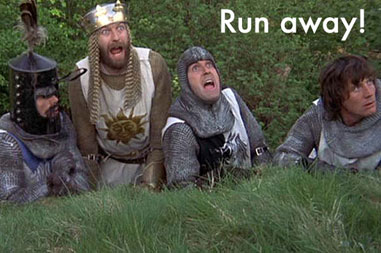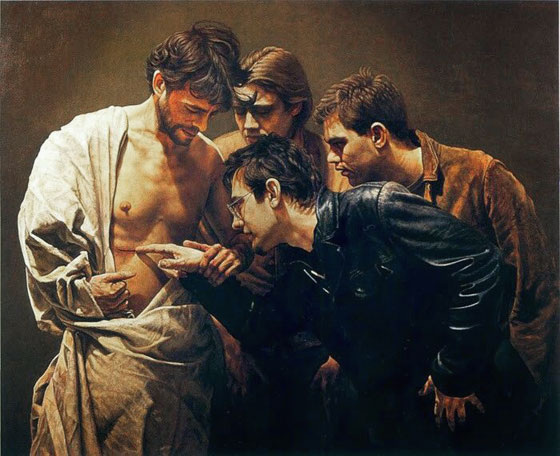
Reading the Gospel
in a Time of Contagion
by Deborah Beach Giordano
We Interrupt this Reading...
John 20:19-31 ~ told by Deborah
That evening, (on the same day that Mary Magdalene met the risen Lord), the disciples were gathered together — with the doors shut and locked, afraid that they might be discovered by their enemies.
And Jesus came and stood among them. “Peace be with you,” he said.
After that, he showed them his hands and his side. Then the disciples were filled with delight when they saw it was the Lord.
“Peace be with you,” he said again, “As the Father sent me, so I send you.”
Then he breathed on them, saying, “Receive the Holy Spirit.…
.... !!!
Wait a minute! What?? Did that say: He breathed on them?! Oh my gosh, can you imagine if Jesus tried to breathe on some of his disciples today? Everybody would positively Freak Out.
 We wouldn’t see it as a blessing; a consecration to ministry, but as a potential contamination. Germs!! Run away!! I can almost see us, pulling our shirts up over our faces, shutting our eyes and turning away… Shielding ourselves from the breath of God.
We wouldn’t see it as a blessing; a consecration to ministry, but as a potential contamination. Germs!! Run away!! I can almost see us, pulling our shirts up over our faces, shutting our eyes and turning away… Shielding ourselves from the breath of God.
It sounds silly, doesn’t it? Welcome to what is being called “the new normal” — a notion I disagree with adamantly.
There is nothing normal — nor acceptable — in being programmed to live in fear of human contact: to “keep your distance,” to “avoid one another,” to cringe at the sight of another person. And now they are making noises about extending the mandate into September, January of next year, or even beyond.
Artificial Intelligence
One of the more troubling aspects of this new normal is our nearly exclusive reliance on technology to connect with one another. All of our socializing is now “distant”: lingering on Facebook, gossiping on Nextdoor, communicating by emails and text messages, popping up on SnapChat, attending conferences on Zoom… Even intimate conversations are held an arm’s length away across the divisions of cell towers and internet servers.
While it is indeed marvelous that we can keep in touch via technology, these same virtual spaces increase the distance and alienation between us. It is a universe constructed of artifice and illusions. There is nothing genuine, no honesty in the carefully designed images that are broadcast from strategically-positioned screens. We need look no further than our own (virtual) selves. On review and repeat, it is another person who is speaking: a being from a different time, a communication from a different place, someone we hardly recognize. Our voice sounds strange, our meaning less than clear, and we don’t look like that, surely? It isn’t really who we are.
 We now communicate with an eye to acceptance: conscious of our appearance, our tone of voice, our accents, our mannerisms, and, most of all, our messages. In the virtual world we are immersed, unwillingly, often unconsciously, in a giant popularity contest; there is realtime evidence of how we are received: the number of upvotes, “likes,” pings, replies, friend requests, and invitations to connect on LinkedIn. And everybody likes to be liked.
We now communicate with an eye to acceptance: conscious of our appearance, our tone of voice, our accents, our mannerisms, and, most of all, our messages. In the virtual world we are immersed, unwillingly, often unconsciously, in a giant popularity contest; there is realtime evidence of how we are received: the number of upvotes, “likes,” pings, replies, friend requests, and invitations to connect on LinkedIn. And everybody likes to be liked.
We human beings are designed to associate: to interact with one other, to communicate and learn from one another, to support and encourage one another. We often get a large part of our encouragement — sometimes to a dangerous degree — from those who share our worldview and opinions: from our “tribe.” Unfortunately we can get caught up within those tribal boundaries and never grow or learn; stifled, silenced, stupid.
Sadly, nowhere are those boundaries stricter than on the internet.
It creates comfortable, seemingly-familiar situations: a community, a group, “friends,” colleagues, common causes and shared concerns. There is no overt coercion, only the promise to fulfill our innate yearning to connect, and we willingly enter in. Then the gates slam shut and we are confined within a reality “tailored” — by a faceless, unknown, inhuman program — to fit the interests, the desires, and the needs we have unwittingly revealed. Or, to speak more accurately, it is we who are being tailored to “fit” the desired reality.

Those who seek to cheat and manipulate long-ago recognized how deceptive this techno-world can be. We’ve all witnessed how Tweets, Facebook memes, and WhatsApp slams and snark and shaming can instantly transform this society into a vicious, howling mob — despoiling and devouring careers, reputations, and even the lives of selected victims. Carried along with the thrill of the chase, we are tempted to join in, justifying the attacks as our participation in something “bigger than ourselves.” (As, indeed, it is. Sadly, that something is the Force of Destruction.)
All this is part of the fearsome, uncontrolled power of the internet: crushed spirits, broken hearts, enforced silence. And we will never get an accurate body count of the depressed, distressed, isolated, self-harming, and self-destructive teenaged lives that are taken “virtually.”
The Lord Christ said, “In everything, then, do to others as you would have them do to you. For this is the essence of the Law and the prophets.”
~ Matthew 7:12, Luke 6:31
We must never forget who we are and Whose we are. We are called to live in every group and all communities with Christian grace and compassion: to treat others as we would have them treat us — including “virtually.”
Virtual / Reality
Many years ago it was demonstrated that infants deprived of human touch but otherwise well cared-for simply give up on life. The babies died — of no disease or illness but loneliness and despair. How many adults and elders perish from the same causes in our time?
Virtual contact obscures essential, discreet clues that lead to genuine communication; to understanding, to compassion, to trust, to love. Even with the purest motives, the artifice remains — subtle nuances are lost in transmission; there is no warmth, no scent, no pulse, no touch, no authentic human presence; only hints, guesswork, and a computer-generated facade.
We are not virtual beings, but living breathing creatures of flesh and blood, wondrously made. To miss out on that genuine reality is to miss out on life itself.
We are designed to be with one another: in person, in real life. We must never forget that; we must never accept “virtual” as a replacement for reality.
A Timely Lesson?
 Perhaps there is a blessing hidden within this terrible event; an immersion in the virtual world that has steadily encroached on our lives — alongside the deprivation of most (in some cases, all) human contact. Many of us have come to a greater appreciation of everyday encounters which we previously took for granted; we recognize the chain of humanity that is essential to all our existences; we’ve learned the limitations and frustrations in trying to live — if you can call it that — ensnared in the “Net.”
Perhaps there is a blessing hidden within this terrible event; an immersion in the virtual world that has steadily encroached on our lives — alongside the deprivation of most (in some cases, all) human contact. Many of us have come to a greater appreciation of everyday encounters which we previously took for granted; we recognize the chain of humanity that is essential to all our existences; we’ve learned the limitations and frustrations in trying to live — if you can call it that — ensnared in the “Net.”
I pray that we will emerge from this as a grateful, awakened people; fully present to the moment and to the beauty all around us; aware of how precious and rare each and every person is; honoring our bodies and our senses; reaching out to one another with compassion and delight — as if the very first human being discovering the other. How perfect, how magnificent, how wonderful, how true that each life is a gift from God!
The alternative is that we may grow docile and dependent upon the Web, wrapped up in programmers’ hypnotic illusions. Seeking warmth and kindness from the glowing, unfeeling, uncaring screen, we will be like those tragic infants, devoid of human contact, our lives fading steadily away.
I remain hopeful, confident, in fact, that God’s grace and goodness will prevail, that the Holy Homing Beacon will lead us to where we should be. The Flame of divine compassion remains burning, the Light that does not fail; we are not alone — even when it seems as if no one else is there, we are never abandoned. When all else seems lost, love remains. It comes to us, even — perhaps especially, in our darkest night.
To see that truth in action, let us return to our Gospel reading. Perhaps we ought to begin by taking a deep breath…😉
Jesus breathed on them: “Receive the holy Spirit,” he said, “If you forgive the sins of any, they are forgiven; if you hang on to the sins of any, they remain.”
But one member of the community wasn’t there when all of this went on. Thomas, who was called the Twin, got the story second-hand. And that wasn’t good enough.
When the other disciples told Thomas, "We have seen the Lord!” he said, “No way. Unless I see the marks of the nails in his hands, and touch and feel the wounds, and the warmth of his skin, I will not believe."
Don’t give me your pretty stories — don’t lie to me.
Good old Thomas. He speaks for all of us who insist on knowing: really and truly. None of this “virtual” business for him. Now, more than ever, he’s the man for us: he demands human contact; not even seeing is believing for him. “Unless I can touch and feel and experience the reality of the Lord — the solid humanity of Christ — I’m not buying it.”
A virtual Jesus, somebody else’s story about the Lord, has no power; it’s just a nice story. It is only when we experience the risen Christ: when we feel and know the reality of embodied compassion and love, when we are encouraged, nurtured, and cared for — only then can we say, “My Lord, and my God.”
Like Thomas we can insist: “Lord, I really need to see You in my life and my world.”
And, lo and behold!

A week later the Lord’s disciples were again gathered together in the house, and Thomas was with them. Although the doors were closed, Jesus came and stood in their midst.
“Peace be with you.” he said.
Then he turned to Thomas, “Touch and see my hands. Reach out and feel the wound in my side. Don’t doubt, but believe.”
Thomas answered him, “My Lord and my God!”
Jesus said, “Have you believed because you have seen me? Blessed are those who have not seen and yet have come to believe.”
Before we get carried away in thinking that Jesus is scolding Tom for having doubted, we need to remember that it was after “Jesus showed them his hands and his sides, then the disciples were delighted to see the Lord.” Up until that point those others apparently didn’t believe He was the risen Christ; further, it is Thomas who is the first disciple to call Jesus “my Lord and my God.” The fellow who insisted upon seeing the real Jesus in person, in the flesh, was the first apostle of the Christian faith! That seems like a pretty important point to consider.
The disciples saw Jesus do a lot of other things that weren’t written down. But what was included is there so that you may come to believe that Jesus is the Messiah, the Son of God, and that through believing you may have life in His name.
May we have life — real life — in Jesus’ name, may we make even the virtual world one in which the Truth is vibrantly, powerfully true and transforming; may we bless and heal, sustain and uplift all those we encounter. May we be living embodiments of Christ, wherever we are and whatever we do.
Christ’s grace and healing love be with you,
Deborah ✟
Suggested Spiritual Exercise
In Christ you have received the Holy Spirit, share that divine grace, kindness, and compassion with everyone you meet, wherever you are. That is the “contagion” our world is in desperate need of.